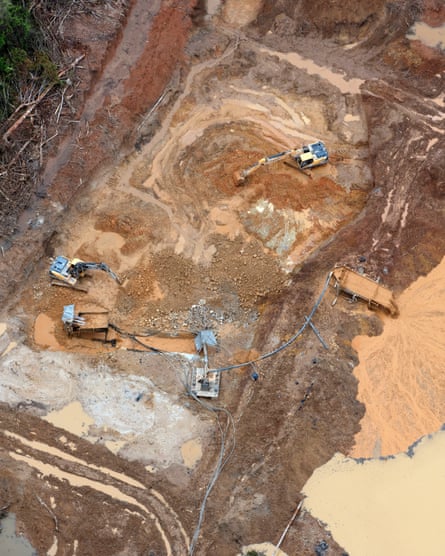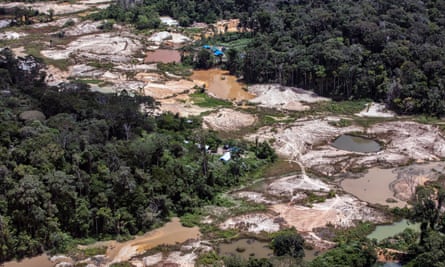Hyundai is being urged to prevent its heavy machinery products from being used in illegal mining and environmental destruction in the Brazilian Amazon.
A report published by Greenpeace on Wednesday found the South Korean conglomerate’s excavators and other heavy machinery are precipitating the destruction of the rainforest and putting the survival of Indigenous populations at risk.
In flyovers carried out over the Yanomami, Munduruku and Kayapó protected Indigenous territories between 2021 and March 2023, Greenpeace recorded 176 diggers illegally carving up the forest. Of these, 75 were identified as Hyundai-branded.
The arrival in recent years of hydraulic excavators in the Brazilian Amazon has dramatically accelerated the expansion of illegal gold mining there. One of these machines can in 24 hours perform work that would take three men 40 days to complete, the report said.
This increased efficiency is pushing wildcat miners ever deeper into supposedly protected areas of the forest in search of new gold deposits, said Danicley de Aguiar, senior forest campaigner at Greenpeace Brazil.
The Guardian saw diggers wrecking Yanomami land last December. Excavators are believed to have only recently been moved into Brazil’s largest Indigenous reserve, where the large-scale invasion of illegal miners combined with the neglect of the previous Jair Bolsonaro government has produced a humanitarian catastrophe.

But diggers were first sighted in the Munduruku territory, located about 620 miles south in the state of Pará, in 2014, while the worst-affected Kayapó land has been affected by the use of heavy machinery since 2010.
“Illegal mining breaks up our villages, it destroys our culture and annihilates our Kayapó tradition,” said Doto Takak-Ire, a Kayapó leader who has for decades watched the deforestation, river and soil pollution, and social disorder caused by the search for gold.
Greenpeace investigators counted 140 excavators on Kayapó land, 88 of which were found during a flyover in March.
Brazil’s president, Luiz Inácio Lula da Silva, has promised to end illegal mining on Indigenous lands, but Greenpeace said these recent numbers show that efforts by environmental law enforcement to destroy the machinery cannot keep up with the pace at which new diggers are acquired and transported into these areas.
The report argues that manufacturers such as Hyundai have a moralduty to ensure that their equipment is not used to commit environmental crimes and human rights violations, and says the firms have the technology to do this.
“All the companies that make excavators already have remote monitoring technology, which can even switch off the machines if necessary,” said Aguiar. “We’re asking that this technology, which already exists, be used in collaboration with [Brazil’s] environmental protection agencies.”
after newsletter promotion
Hyundai, whose heavy machinery manufacturing subsidiary has received plaudits for its environmental, social, and corporate governance commitments, should set an example, said Daul Jang, advocacy specialist for Greenpeace east Asia.

The company’s Brazil business is booming, which, Jang said, “shows they are profiting from the sale of construction heavy machinery to the Brazilian market, including the Amazon”.
Greenpeace found that an authorised reseller of Hyundai equipment had dealerships sited close to the three Indigenous territories, in areas where there is otherwise little demand for heavy machinery.
In 2020, Brazilian prosecutors investigated the responsibility of heavy machinery manufacturers and suppliers for the damage caused by their equipment in the hands of illegal miners. Hyundai did not at the time respond to prosecutors’ request for information on measures taken to limit such uses, Greenpeace said. The company also declined to comment on a 2021 report into the matter by Brazilian investigative media Repórter Brasil.

 1 year ago
49
1 year ago
49










 English (US)
English (US)